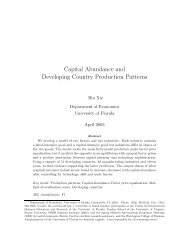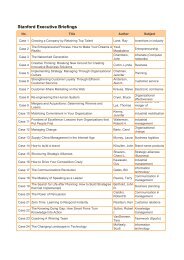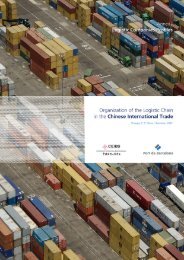Untitled - China Europe International Business School
Untitled - China Europe International Business School
Untitled - China Europe International Business School
You also want an ePaper? Increase the reach of your titles
YUMPU automatically turns print PDFs into web optimized ePapers that Google loves.
Organization of the logistic chain in the Chinese international trade<br />
VI. Conclusions<br />
Players participating in the <strong>China</strong>-<strong>Europe</strong> logistic chain are mainly international companies.<br />
Chinese domestic companies will progressively gain more prominence.<br />
Main shippers and logistic and transport operators involved in the logistic chain in the trade between<br />
<strong>Europe</strong> and <strong>China</strong> are foreign international companies. As Chinese companies become international<br />
they will take a more decisive role in the logistic chain.<br />
Decision-making in the logistic chain is definitely located in <strong>Europe</strong> (or overseas).<br />
Cargo owners’ Global headquarter in <strong>Europe</strong> (or overseas) as well as Forwarder’s headquarters in<br />
<strong>Europe</strong> are currently taking care of the strategic design of the logistic chains of exports to <strong>Europe</strong>.<br />
Headquarters in <strong>China</strong> assume the role of monitoring the operations between <strong>China</strong> and <strong>Europe</strong>.<br />
However, guanxi which is deeply present in the way of doing business in <strong>China</strong> has to be taken into<br />
consideration, as it seems to have a concealed influence in the decision-making.<br />
More demand for global logistics packages, less fragmented logistic chain.<br />
Shippers are manufacturing or sourcing in <strong>China</strong> and other cost-advantage areas in Asia and selling all<br />
around <strong>Europe</strong>, and even worldwide. They are demanding more global logistics packages to all<br />
transport and logistic operators in order to provide the services required at a global level. The global<br />
packages refer to a geographical scope, however they also point out to a more extended range of<br />
services which will help reducing the fragmentation of the logistic chains.<br />
More operations will be performed in <strong>China</strong>.<br />
In some industries, shippers and customers are increasing the operations performed in <strong>China</strong> and<br />
therefore streamlining the facilities and operations needed in <strong>Europe</strong>. <strong>International</strong> Forwarders and<br />
3PL’s will need to increase their services in <strong>China</strong> for their <strong>Europe</strong>an customers, developing more<br />
complex logistic facilities and operations as well as performing more value added services to the goods.<br />
This will also demand more integration with Chinese suppliers.<br />
The increasing practice to consolidate cargo in <strong>China</strong> and build direct to customer containers shipped<br />
directly to the customer facility in <strong>Europe</strong> will likely have an impact in the need of distribution centers in<br />
<strong>Europe</strong> and diversify the ports of destination.<br />
Fewer players in the logistic chain but more powerful ones.<br />
In order to take advantage of economies of scale and synergies and sometimes just to remain<br />
competitive, companies are growing through M&A or using strategic alliances. This progressive<br />
concentration in fewer actors is also impacting in the organization of logistic chains as companies are<br />
developing their activities using a network approach to embrace more geographical areas but also to<br />
establish connections between these areas that can improve the overall efficiency.<br />
Specialization in niche markets is the path for small and medium size transport operators in order to<br />
remain competitive.<br />
CEIBS Port of Barcelona Chair of Logistics 61










